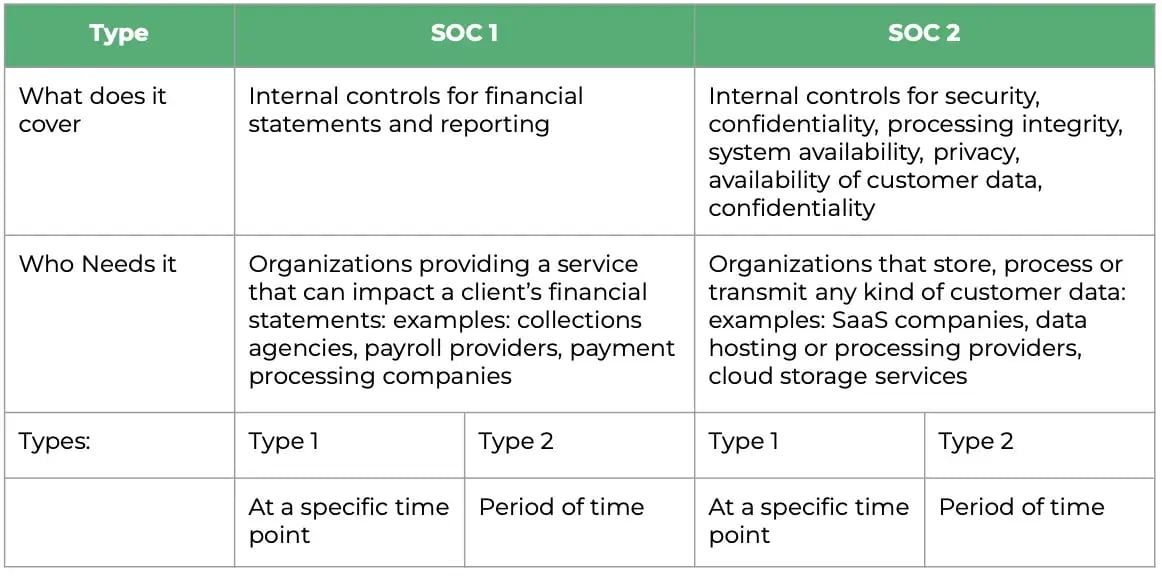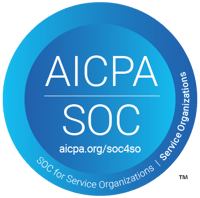Security certifications play a crucial role in establishing trust and safeguarding sensitive data within the digital landscape. Many SaaS providers rely on their cloud providers’ security certifications to assure the safety of their customer’s data. However, there is a fundamental gap that product companies need to address: the security of the product itself. Relying solely on a cloud provider’s certification may secure the environment, but it doesn’t inherently secure the product, its development processes, or the activities of the SaaS provider. This is why obtaining a SOC-2 certification for the SaaS provider is essential.
Types and purposes of SOC certifications:

Understanding the Limitations of Cloud Provider Certifications
Cloud provider security certifications are only responsible for securing the infrastructure on which a SaaS product is built on and fail to protect the product itself. Imagine a physical vault in a highly secure building—while the building may have cameras, guards, and reinforced walls, if the vault itself isn’t secure, it remains vulnerable to unauthorized access. SOC-2 certification addresses this gap by auditing a SaaS company’s entire security framework, covering technical measures as well as operational practices.

Key Aspects of SOC-2 Certification for SaaS Providers
Contrary to popular belief, SOC-2 certification encompasses more than just data security. In fact, it covers the entire operational process of the organization with requirements ranging from background checks and product documentation to daily backups and vulnerability scans. The certification means that the whole company is held to a high standard with known and audited protocols. SOC-2 certification offers a rigorous and comprehensive framework for evaluating security across critical areas, which include:
Infrastructure Security
- Penetration Testing: Regularly probing systems to identify and fix vulnerabilities.
- Vulnerability Scans: Continuously scanning for and addressing potential security weaknesses.
- Continuous Monitoring: Adhering to security best practices for real-time threat detection.
- Data Backups: Performing daily backups to protect data integrity and availability.
Operational Security
- Business Continuity Plans: Ensuring ongoing operations in the event of disruptions.
- Disaster Recovery Procedures: Quickly restoring systems following security incidents.
- Risk Management: Identifying, analyzing, and mitigating potential risks.
- Secure Development Practices: Incorporating security throughout the development lifecycle.
- Incident Response Plans: Efficient response to security events.
- Restricted Access: Limiting sensitive data access based on need-to-know.
Beyond Technical Aspects
SOC-2 certification goes further by covering non-technical, human-centered elements, which are critical to a secure organization:
- Human Resources Policies: Enforcing security practices among all employees.
- Security Awareness Training: Regularly educating employees on security protocols.
- Background Checks: Ensuring trustworthy personnel.
- Confidentiality Agreements and IT Insurance: Protecting company and customer data.
- Board Oversight: Making security a priority at the executive level, ensuring it permeates the organization’s culture.
Building Customer Trust
SOC-2 certification allows SaaS providers to transparently display their commitment to security. For customers, knowing their provider is SOC-2 certified reassures them that the company not only meets high standards but also undergoes regular audits to maintain those standards.
Some best practices for communicating security practices to customers include:
- Trust Pages: Publicly detailing the company’s security protocols, certifications, and procedures.
- Security Status Pages: Providing real-time updates on incidents and current security status.
- Customer Support Portals: Offering swift and accessible assistance for inquiries.
- Product Release Notes and Documentation: Keeping customers informed of security practices and product updates.
Why SOC-2 Matters for SaaS Providers
SOC-2 certification is more than just a technical badge—it represents an organizational commitment to safeguarding data, ensuring robust internal processes, and maintaining high standards across every level of the business. Relying solely on a cloud provider’s certification leaves gaps that could compromise the product's integrity, making it vulnerable to potential security breaches and operational disruptions.
A SOC-2 certification demonstrates a SaaS provider’s commitment to an end-to-end secure ecosystem. This dedication not only protects customer data but also strengthens the trust customers place in the product and the company behind it. By proactively managing security risks, maintaining transparent practices, and prioritizing security at every organizational level, a SOC-2 certified SaaS provider can offer peace of mind to its customers.
In today’s competitive and security-conscious market, achieving SOC-2 compliance isn’t just a best practice—it’s a strategic advantage. It signifies a SaaS provider’s dedication to creating a resilient, trustworthy, and secure environment that customers can rely on, ensuring lasting partnerships and a strong reputation in the industry.
That’s why we, here at PSignite, have invested in your data security and are proudly SOC-2 certified!
Get in touch with us here to explore our SOC-2 certified, secure solutions.